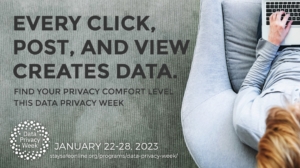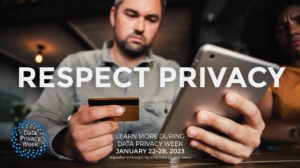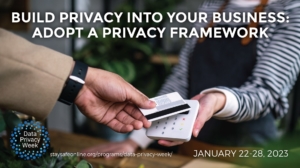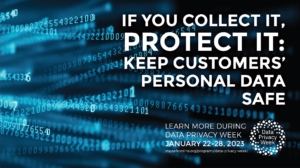What is Data Privacy Week?
In 2022, the National Cybersecurity Alliance expanded the Data Privacy Day campaign into Data Privacy Week. Data Privacy Day began in the United States and Canada in January 2008 as an extension of Data Protection Day in Europe. Data Protection Day commemorates the Jan. 28, 1981 signing of Convention 108,the first legally binding international treaty dealing with privacy and data protection.
Data Privacy Week helps spread awareness about online privacy and educates citizens on how to manage their personal information and keep it secure. Data Privacy Week also encourages businesses to respect data and be more transparent about how they collect and use customer data.
Why is Data Privacy Important?
Today we conduct much of our lives on the internet and on our connected devices, yet few people understand that enormous amounts of personal information is collected and shared. This data can be stored indefinitely, and our personal information can be used in both beneficial and unwelcome ways. Even seemingly innocuous information – such as your favorite restaurants or items you purchase online – can be used to make inferences about your socioeconomic status, preferences and more.
Many companies have the opportunity to monitor their users and customers’ personal behavior and sell the data for profit. Consumers need to understand how it is collected, used, and shared to make informed decisions and understand the true value of their data.
Advice for Individuals: Keep It Private
Everything you do online generates data. There’s data about your activities, behaviors, and interests. There’s your personal data, like your social security and driver’s license numbers. And there’s data about the physical you, like health data. It’s easy to feel a lack of control over the information collected about you. However, there are steps you can take to learn about the types of data you’re generating online, and how it’s collected, shared and used. Consumers are becoming increasingly concerned with data privacy, and companies are realizing this and responding. Be selective about who you choose to do business with and understand the value of your data.
Follow these steps to better manage your personal information and make informed decisions about who receives your data:
Understand the Privacy/Convenience Tradeoff
 Many accounts ask for access to personal information, such as your geographic location, contacts list, and photo album, before you even use their services. This personal information has tremendous value to businesses and allows some to even offer you their services at little to no cost.
Many accounts ask for access to personal information, such as your geographic location, contacts list, and photo album, before you even use their services. This personal information has tremendous value to businesses and allows some to even offer you their services at little to no cost.
Make informed decisions about whether or not to share your data with certain businesses:
- Considering the amount of personal information they are asking for, and weigh it against the benefits you may receive in return.
- Be thoughtful about who gets that information and wary of apps or services that require access to information that is not required or relevant for the services they are offering.
- Delete unused apps on your Internet-connected devices and keep others secure by performing updates.
Manage Your Privacy
 Once you have decided to use an app or set up a new account, check the privacy and security settings on web services and apps and set them to your comfort level for information sharing. Each device, application or browser you use will have different features to limit how and with whom you share information.
Once you have decided to use an app or set up a new account, check the privacy and security settings on web services and apps and set them to your comfort level for information sharing. Each device, application or browser you use will have different features to limit how and with whom you share information.
Get started with the National Cybersecurity Alliance’s Manage Your Privacy Settings page to check the settings of social media accounts, retail stores, apps and more.
Protect Your Data
 Data privacy and data security go hand in hand. Keep your data secure by:
Data privacy and data security go hand in hand. Keep your data secure by:
- Creating long, unique passwords for each account and device.
- Storing passwords in a password manager.
- Performing software and browser updates when they become available.
- Enabling multi-factor authentication (MFA) wherever possible.
- MFA has been found to block 99.9% of automated attacks when enabled and can ensure your data is protected, even in the event of a data breach.
Advice for Organizations: Respect Privacy
 According to a Pew Research Center study, 79% of U.S. adults report being concerned about the way their data is being used by companies. Respecting consumers’ privacy is a smart strategy for inspiring trust and enhancing reputation and growth in your business.
According to a Pew Research Center study, 79% of U.S. adults report being concerned about the way their data is being used by companies. Respecting consumers’ privacy is a smart strategy for inspiring trust and enhancing reputation and growth in your business.
Be open and honest about how you collect, use and share consumers’ personal information. Think about how the consumer may expect their data to be used and design settings to protect their information by default. Communicate clearly and concisely to the public what privacy means to your organization and the steps you take to achieve and maintain privacy.
Follow these steps to assess and improve your data collection practices and encourage a culture of privacy in your organization.
Conduct an Assessment
 Conduct an assessment of your data collection practices. Whether you operate locally, nationally, or globally, understand which privacy laws and regulations apply to your business.
Conduct an assessment of your data collection practices. Whether you operate locally, nationally, or globally, understand which privacy laws and regulations apply to your business.
- Follow reasonable security measures to keep individuals’ personal information safe from inappropriate and unauthorized access.
- Make sure the personal data you collect is processed in a fair manner and only collected for relevant and legitimate purposes.
- Don’t forget to maintain oversight of partners and vendors as well. If someone provides services on your behalf, you are also responsible for how they collect and use your consumers’ personal information.
Adopt a Privacy Framework
 Researching and adopting a privacy framework can help you manage risk and create a culture of privacy in your organization by building privacy into your business.
Researching and adopting a privacy framework can help you manage risk and create a culture of privacy in your organization by building privacy into your business.
Get started by checking out the following frameworks: NIST Privacy Framework, AICPA Privacy Management Framework, and ISO/IEC 27701 – International Standard for Privacy Information Management.
Educate Employees
 Create a culture of privacy in your organization by educating your employees of their and your organization’s obligations to protecting personal information.
Create a culture of privacy in your organization by educating your employees of their and your organization’s obligations to protecting personal information.
-
- Educate employees on your company’s privacy policy.
- Teach new employees about their role in your privacy culture during the onboarding process.
- Engage staff by asking them to consider how privacy and data security applies to the work they do on a daily basis. Better security and privacy behaviors at home will translate to better security and privacy practices at work.
- Teach employees how to update their privacy and security settings on work and personal accounts.
Access Data Privacy Week resources.
Explore Quanterion Solutions’ cybersecurity services.
Stay connected! Sign up for our cybersecurity email list to receive industry news, resources, and more.


